LASER HAIR GROWTH TREATMENT
Why Choose Us
Our Advantages
Ready to make an appointment for this treatment?
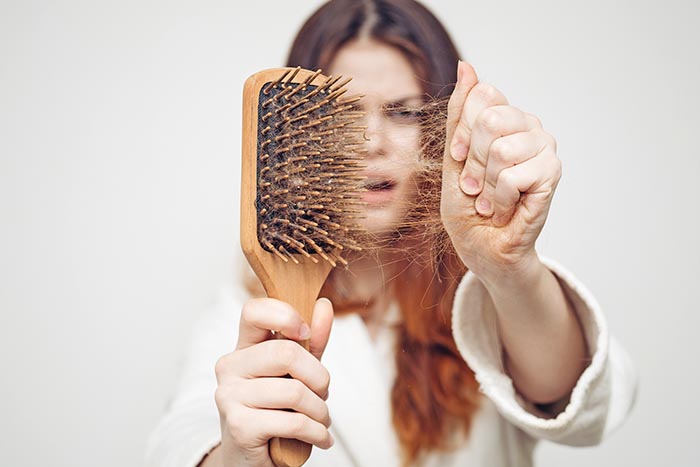
Hair loss is a common problem affecting men and women, characterised by an increased hair weakness leading to a loss of volume and quality of hair.
At BeautyPlus+ Laser Clinic, we offer hair regrowth treatment with repairing and revitalising action that acts on the hair and scalp to stop loss, enhance growth and strengthen it, for improving its quality and amount and returning to it a healthy, bright look.
Different Ways to Stimulate Hair Growth for Men
Hair loss can’t always be prevented and can be caused by either genetics or the environment. But there are treatments and remedies that might help slow down the process.
Causes of hair loss in males
Hair loss could be caused by:
- Genetics and family history: If your relatives have hair loss, you’re more likely to develop it. Male pattern baldness or androgenic alopecia is a genetic condition where people gradually lose hair. This could show up as a slowing receding hairline or thinning patches on the crown of your head.
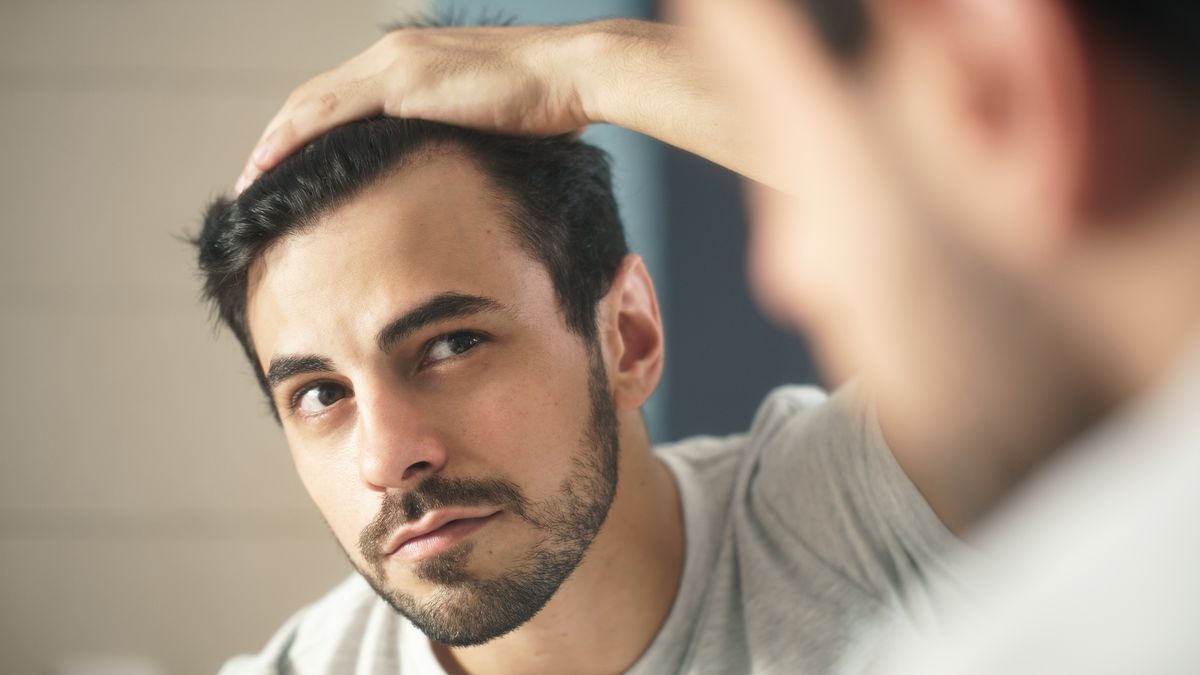
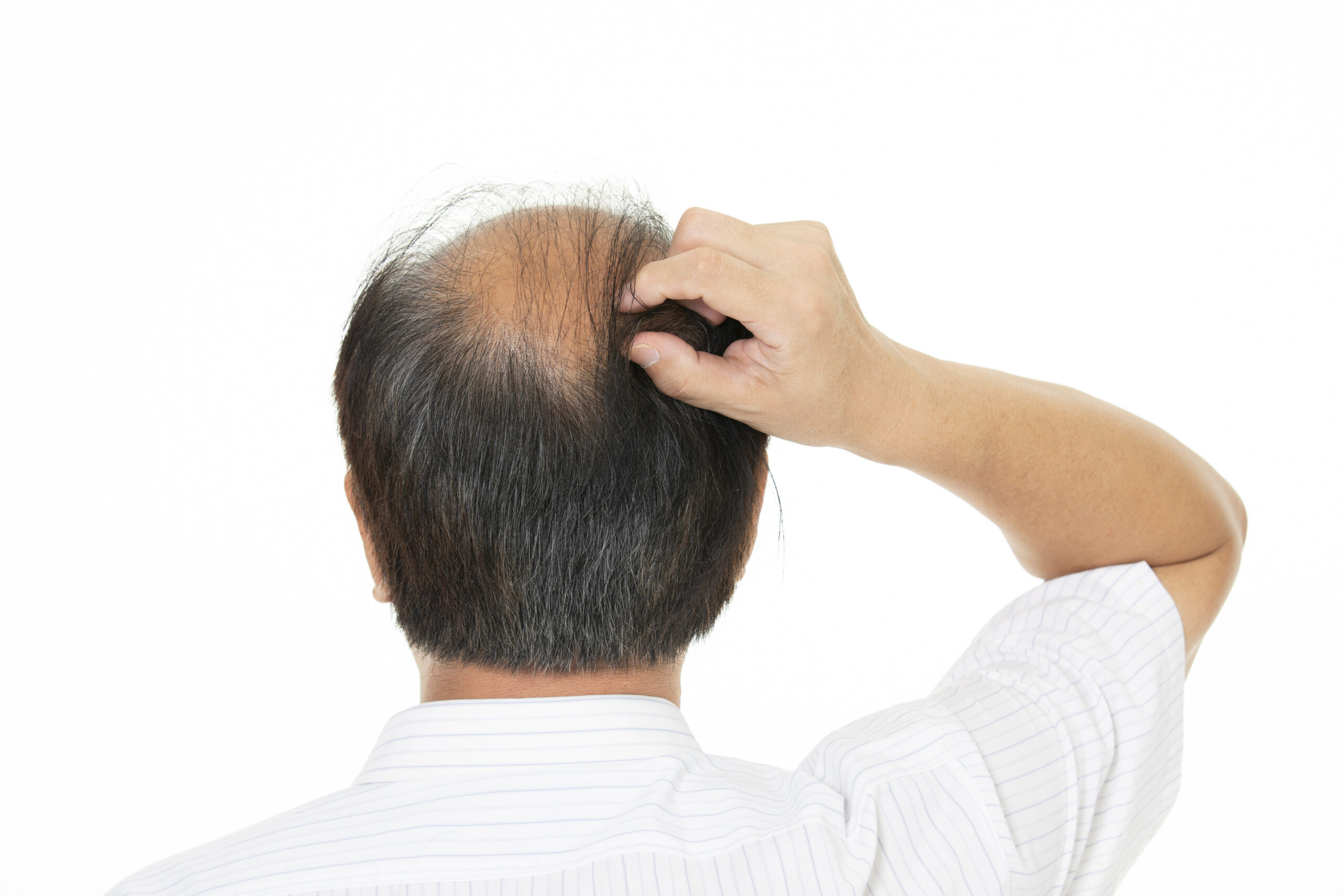
- Medication conditions: Some medical conditions like hormonal problems or autoimmune diseases cause hair loss. For example, thyroid problems, scalp infections, or trichotillomania (a hair-pulling disorder) could lead to thinning hair or bald patches. An autoimmune condition called alopecia areata develops when the immune system attacks hair follicles resulting in bald patches.
- Medications and medical treatments: Hair loss is a potential side effect of several medications for conditions like cancer, depression, gout, heart disease, and arthritis.
- Stress: Chronic stress or stressful events could lead to temporary hair thinning.
No matter the cause, finding a treatment can vary based on the factors listed above and personal preference. To weigh your options, see which type of treatment could work best for you from our picks below.
Laser Hair Growth Therapy
Laser hair growth therapy from low-level laser therapy (LLLT) may increase hair growth through the laser mechanism. This treatment helps reduce the inflammation in follicles that prevents regrowth for some types of hair loss like alopecia areata.
Many trusted source indicates that LLLT is generally safe and effective when used to treat hair loss.
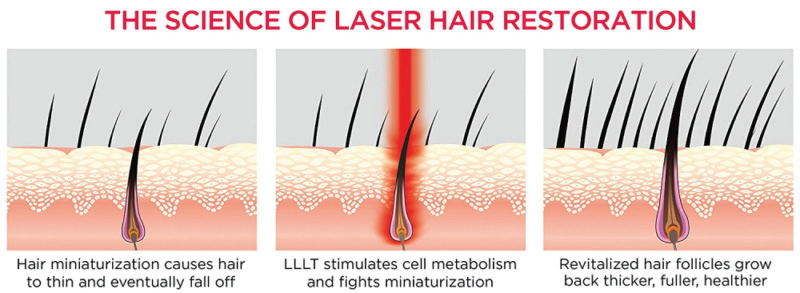
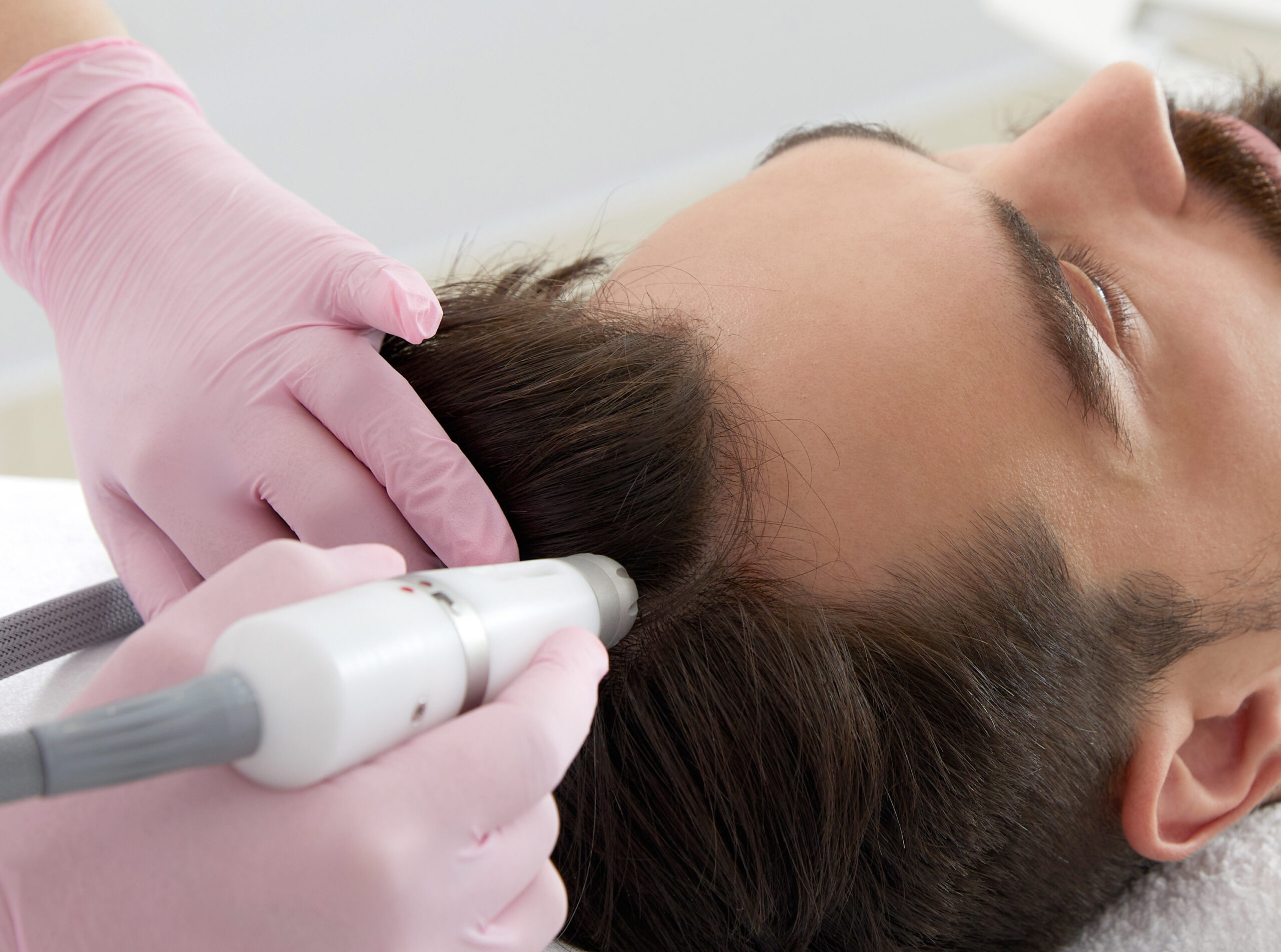
What is the principle of a laser hair growth treatment?
Laser hair growth therapy is a treatment for promoting new hair growth, thickening of the hair and preventing further hair loss. This technology uses a low-level laser to stimulate the cellular activity of the hair follicles. This technology works on the principle of photobiomodulation. Like photosynthesis in plants, photobiomodulation provides the energy that hair follicles need to regenerate. Thanks to its light energy, laser light increases the amount of adenosine triphosphate (ATP). ATP, which is the fuel for living cells in the follicle, promotes increased cell activity.
The lasers used to promote hair growth are low-level lasers. Applying a low-level laser treatment to the scalp helps create an environment that is conducive to hair growth. The energy emitted by the laser light helps to reduce hair loss and strengthen the hair shaft. Laser hair therapy stimulates the hair follicles by increasing blood flow to the scalp.
What are the steps of a laser treatment for pattern hair loss ?
Laser hair treatment can be performed alone or in addition to a hair transplant, as in the case of PRP for example. For optimal results, several sessions are generally necessary.
During a hair laser session, the client is placed under a laser that will propel low-intensity energy onto the scalp. The session lasts an average of 20 minutes, the time necessary for the energies emitted to be properly absorbed by the cells of the capillary dermis. the low-level laser treatments invigorate circulation and stimulation that encourages hair follicles to grow hair.
The laser hair treatment session is less painful. The energies emitted are low level laser light and do not give off any heat.
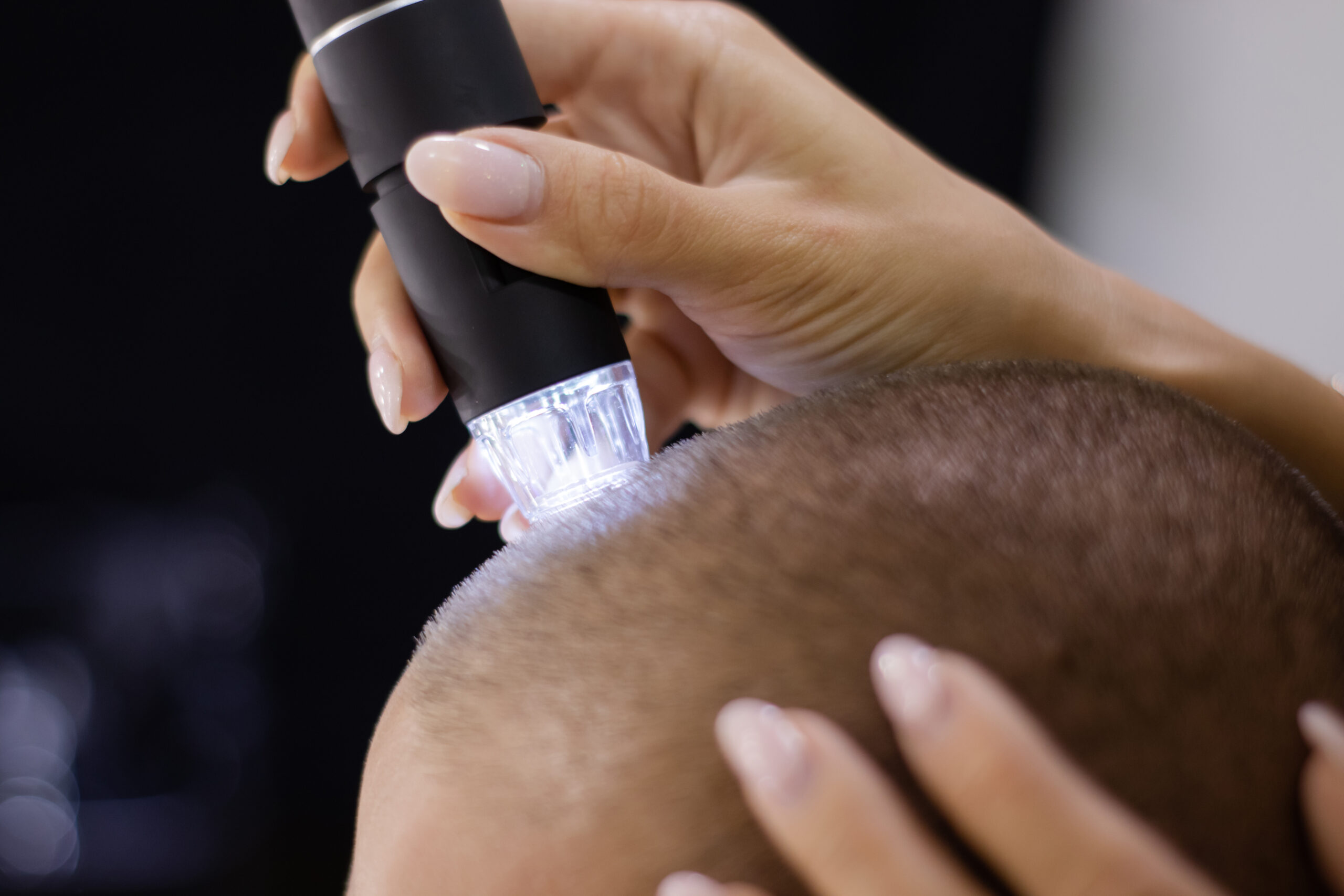

What are the expected results of Laser Hair Therapy?
This laser treatment has many benefits. Painless, safe and non-invasive, this technology has minimal side effects. Used for clients suffering from loss of hair volume, male pattern baldness, thinning hair, hair loss and androgenetic alopecia, laser hair treatment can stimulate hair growth and improve the results of a hair transplant.
Some Common Issues
Are there any contraindications ?
Although laser hair treatment is safe, there are some contraindications to using this technique. Laser treatment is not recommended for pregnant women or women who are breastfeeding. It is also not recommended for people with epilepsy, diabetes, or hemophilia, as well as for people who suffer from skin diseases or inflammation. Taking chemotherapy drugs and photosensitizing drugs or products is also a contraindication to laser hair treatment.
What are the likely side effects?
The laser technology used in the hair loss treatments is safe and without danger. The devices (LLLT device) developed for this type of use are designed to emit laser low-level light to present no risk to the skin and hair.
Side effects from laser hair treatment are extremely rare, if not non-existent. Laser technology is a non-invasive technology that does not disturb the endocrine balance. It does not burn or damage the skin.

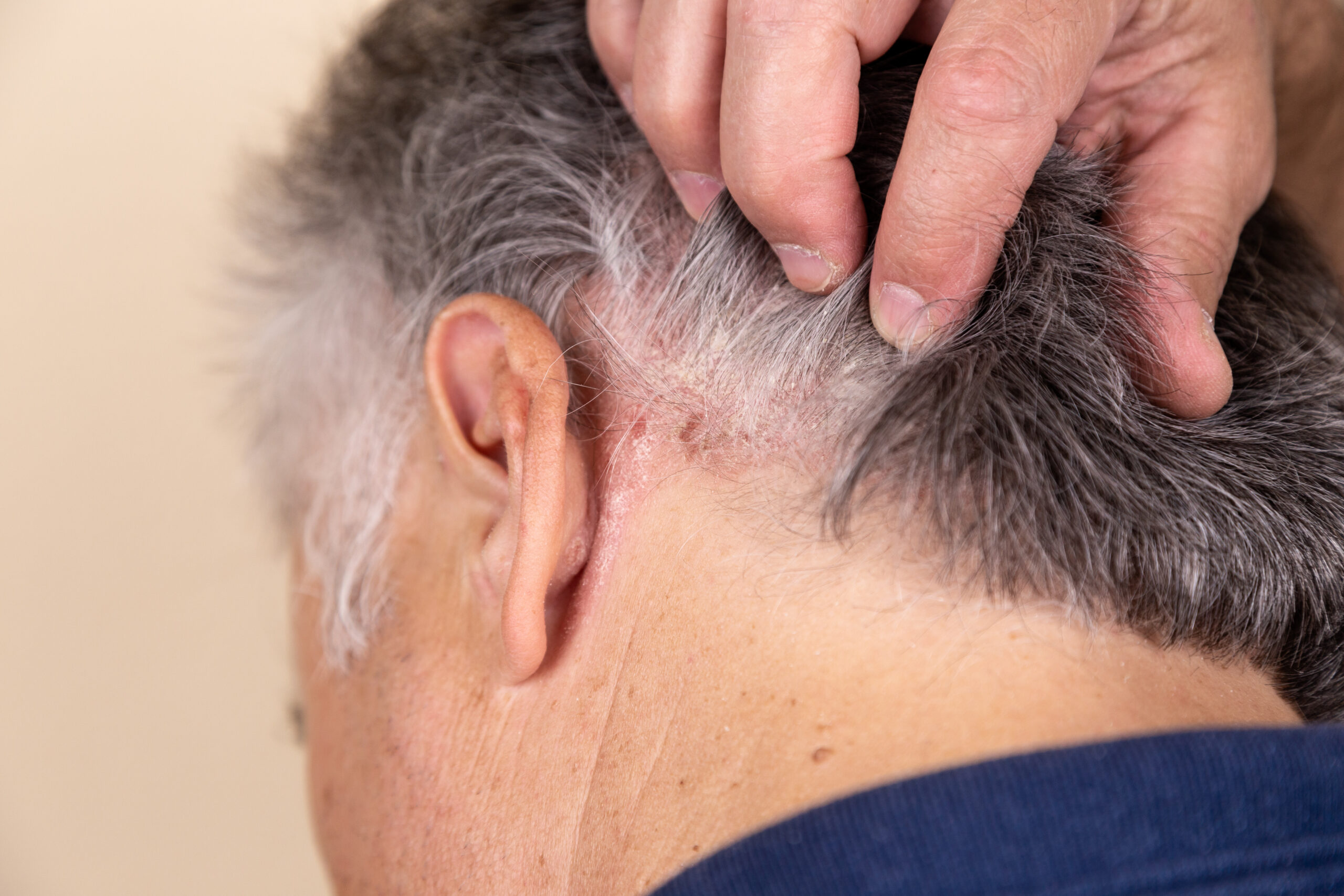
Can we prevent this hair loss?
There are various unfounded “urban myths” about practices that lead to hair loss. Neither washing nor brushing your hair causes it to fall more profusely. What’s more, good hair hygiene is advisable. Our diet, however, plays an important role, and a balanced diet, obviously, is the best guarantee of healthy hair.
If this hair loss persists and becomes concerning, it will be time to consult dermatologists and trichologists to analyse each case. Revatilising and repairing treatments are usually recommended to improve hair quality, stop hair loss and favour growth.
SOLUTIONS
Exclusive combination of copper peptide, vit-B complex, pyridoxine and capsaicin to revitalize fragile, dry and lifeless hair. Decreases the appearance of hair loss through stronger, thicker hair, and it moisturizes the scalp.

The tricology line by mesoestetic® opts for a home treatment with two courses of action:
- Tricology Intensive Hair Loss Shampoo
- Tricology Intensive Hair Loss Shampoo combats hair loss by encouraging blood flow, with zinc and nicotinamide as its essential active ingredients.
- Tricology Intensive Hair Loss Shampoo has been formulated to combat hair weakness by stimulating and strengthening the hair follicles through further hydration and an increased capacity of nutrient absorption.
If you would like to know if a professional hair loss treatment is the most appropriate option for you, contact us and get recommendations from professionals.
Please always consult with our professional therapist to analyse your particular case.
Lifestyle changes
Quit smoking
If you’re a smoker, you’ve likely heard about the negative effects smoking has on your lungs. But did you know that smoking may be associated with hair loss?
A study involving 1,000 men found that the majority of those who smoked had some degree of hair loss, compared with less than half of the participants who did not smoke.
If you smoke, quitting may help decrease hair loss.


Lifestyle changes
A balanced diet may help keep your hair healthy. It’s important to include a variety of vegetables, fruits, whole grains, unsaturated fats, and lean proteins in your diet. Limiting sweets is also helpful.
Doctor suggests an association between certain vitamins and minerals found in food and healthy hair. Consider adding these foods to your diet:
- iron-rich foods, including lean beef, beans, green leafy vegetables, iron-fortified grains, and eggs
- foods rich in omega-3 fatty acids, such as salmon, mackerel, tuna, flaxseeds, egg yolks, hemp seeds, and walnuts
- high protein foods, such as eggs, lean meats, and seafood
Drinking plenty of water is also an important part of a balanced diet.
Reduce stress


What is male pattern baldness?
Male pattern baldness, also known as androgenetic alopecia, is an inherited trait. Medline Plus states that it affects more than half of men over age 50. However, stress or other autoimmune conditions such as alopecia areata can also affect hair loss.
It’s typical to lose around 50 to 100 hairs every day. Usually, this loss isn’t noticeable because new hair grows to replace the hair lost. Hair loss and baldness occur when hair falls out too quickly or new hairs stop growing.
Depending on the cause of hair loss, you may notice slowly thinning hair or a sudden bald patch. Hair loss can impact just the hair on your scalp or the entire body.
Be gentle with your locks
Try to be as gentle as possible when brushing or styling your hair. Constantly twisting, twirling, or pulling your hair tight can lead to hair loss.
If you’re worried about hair loss, you may want to avoid the following:
- tight hairstyles, such as pigtails, cornrows, braids, and buns
- chemicals used in perms and hair straightening treatments
- hot curling irons or straightening irons
- bleaching your hair
If you do use chemicals or bleach in your hair, get help from a trained professional. Do not try to do it yourself at home. Visit a doctor.
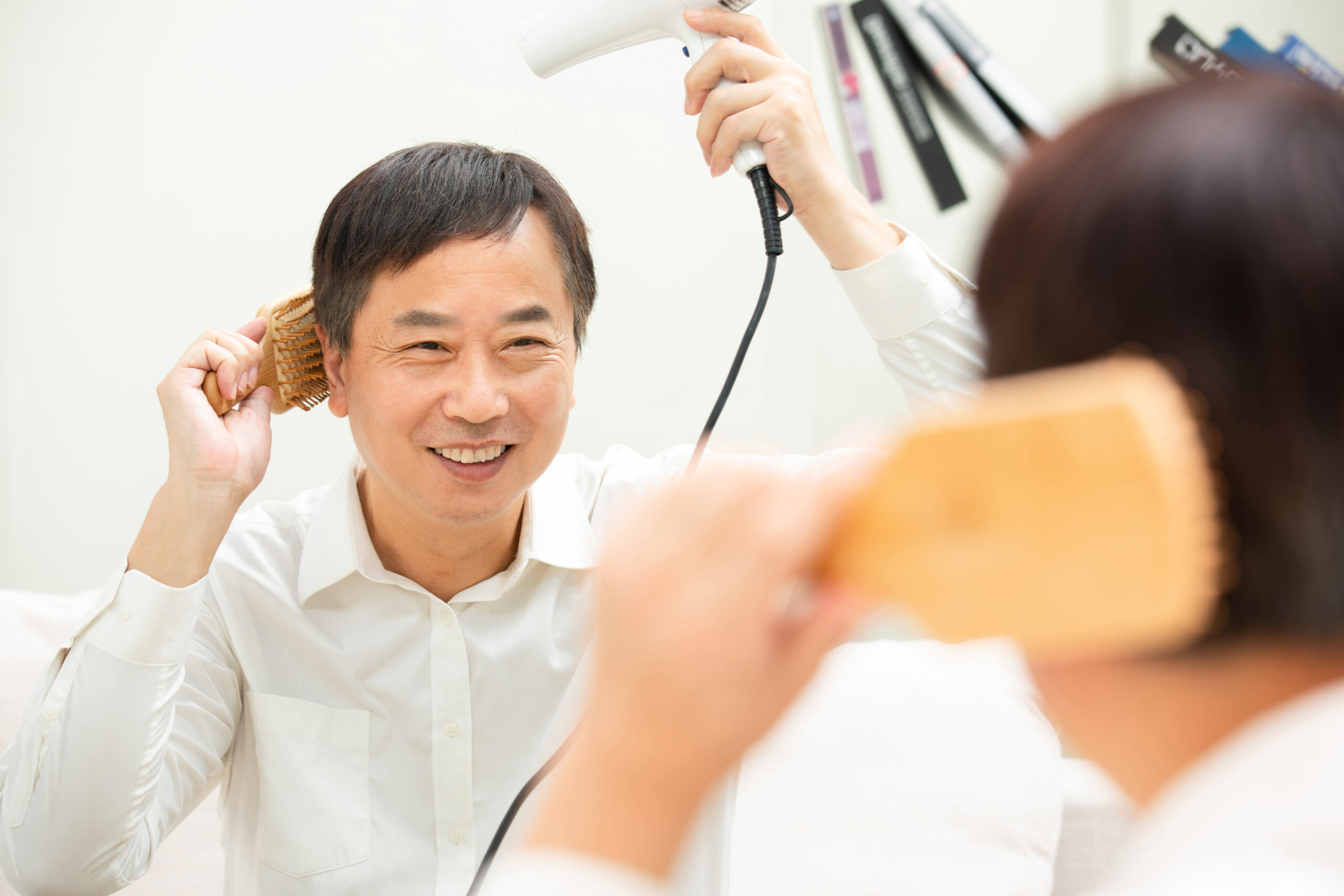
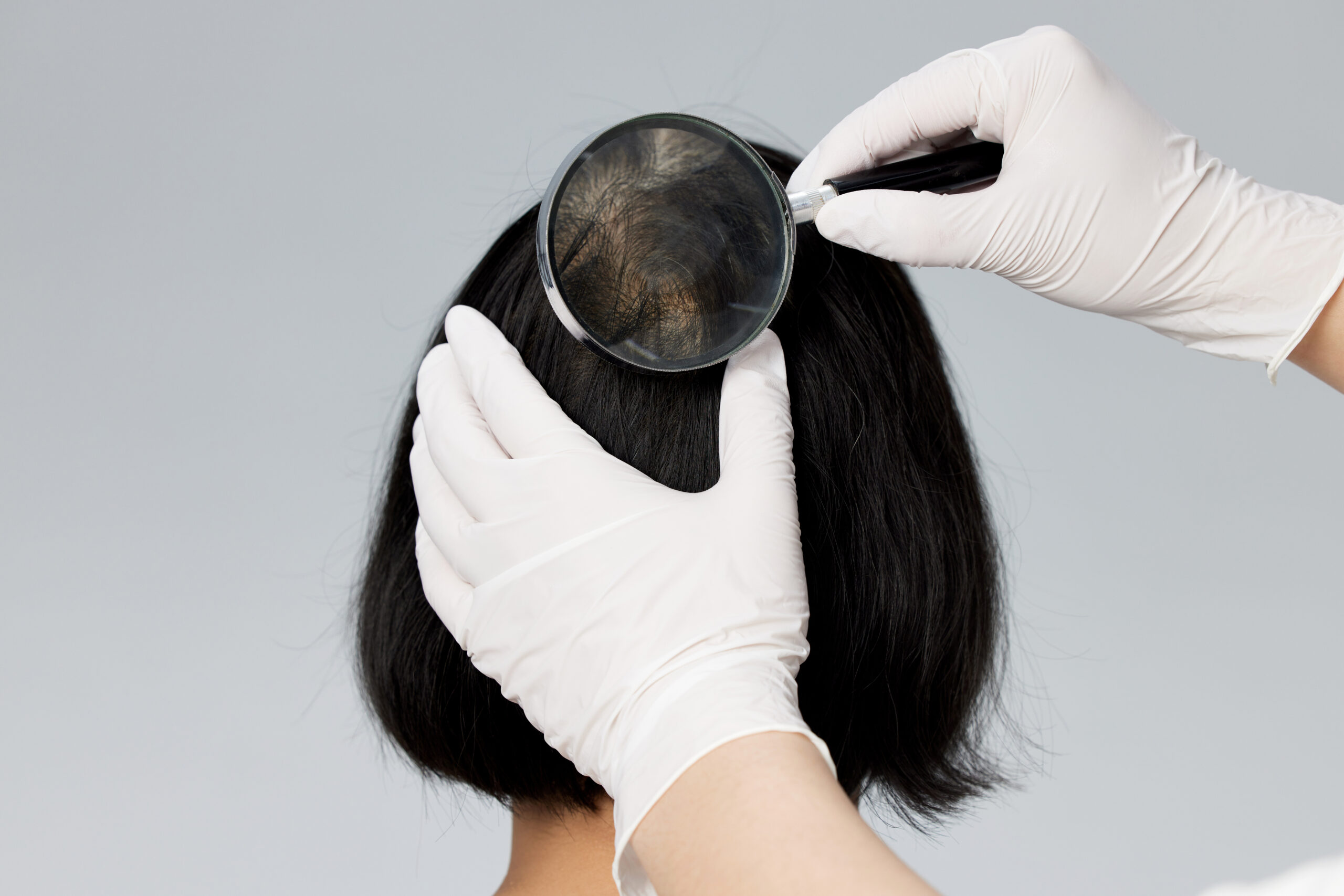
Get a checkup
Aside from your genetics, several medical conditions can cause hair loss. Treating any underlying medical conditions can help address your hair loss.
The following conditions could lead to hair loss:
- diabetes
- lupus
- lichen planus
- sarcoidosis
- scalp psoriasis
- alopecia areata
- thyroid conditions
- eating disorders, due to poor nutrition
- iron deficiency anemia
- hair-pulling disorder, known as trichotillomania
- celiac disease
- syphilis
If you have any of these conditions, or if you’re experiencing other symptoms besides hair loss, talk with a doctor about treating underlying conditions. Your hair loss should improve as your condition improves.
Free consultation and assessment
Cost effective and great result treatment
FAQ
Frequently asked questions about hair loss treatments for men:
The cost of hair loss treatment depends on which treatment you decide to try. We will offer you a quotation during the initial consultation.
Consult with us to figure out which hair loss treatment may be best for you. While OTC and home remedies may work for some, they are not for everyone.
Some people find success with hair loss treatments like Laser Hair growth. But they may not work for everyone.
For example, Rogaine works best for people with hereditary baldness at the back of the head, just under the crown.
It depends on the treatment you’re using. If you’re taking the Laser Hair growth and Mesotherapy, you may need to keep using the hair solutions to maintain results.
It is possible to regrow hair with treatment, medication, or a combination of the two, but there are still some instances and conditions where regrowth is not possible.
If you’re experiencing hair loss or thinning tied to a period of increased stress or change in your nutrition, you will likely begin to regrow hair over time when your stress levels drop or you make changes to your nutritional intake.
However, if your hair loss is caused by a condition like alopecia areata or alopecia totalis or from scalp damage and scarring, it is unlikely that typical medications like minoxidil and finasteride will stimulate hair growth.
If you find limited results from home remedies or OTC products like Rogaine, talk with a healthcare professional about what might be causing your hair loss and how best to treat it.
Whilst we have seen wonderful results from Laser Hair Growth treatments, please know that results do vary and we cannot make guarantees. We recommend coming and speaking to our clinic technicians for an in-depth consultation. They will discuss in detail how the treatment works, whether it will be right for your skin type and the expected results in line with your treatment goals.






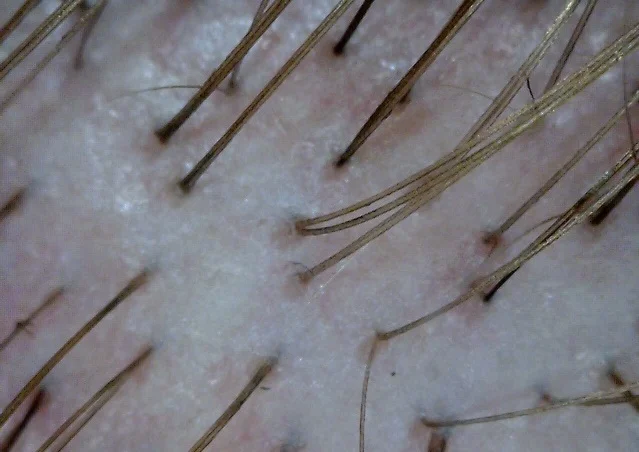
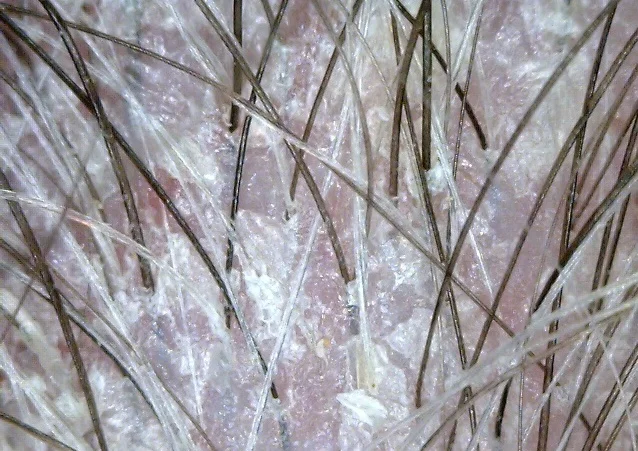
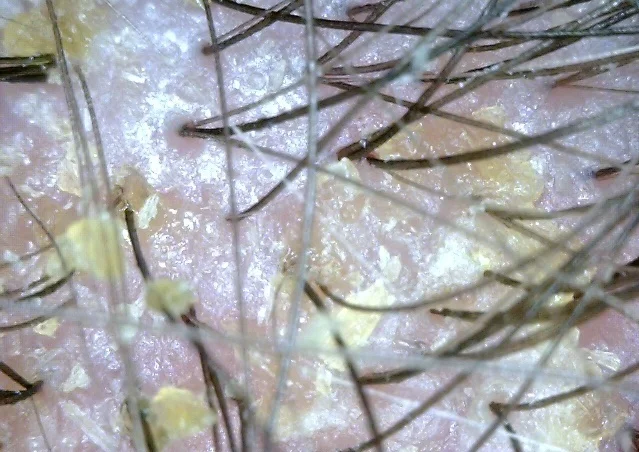

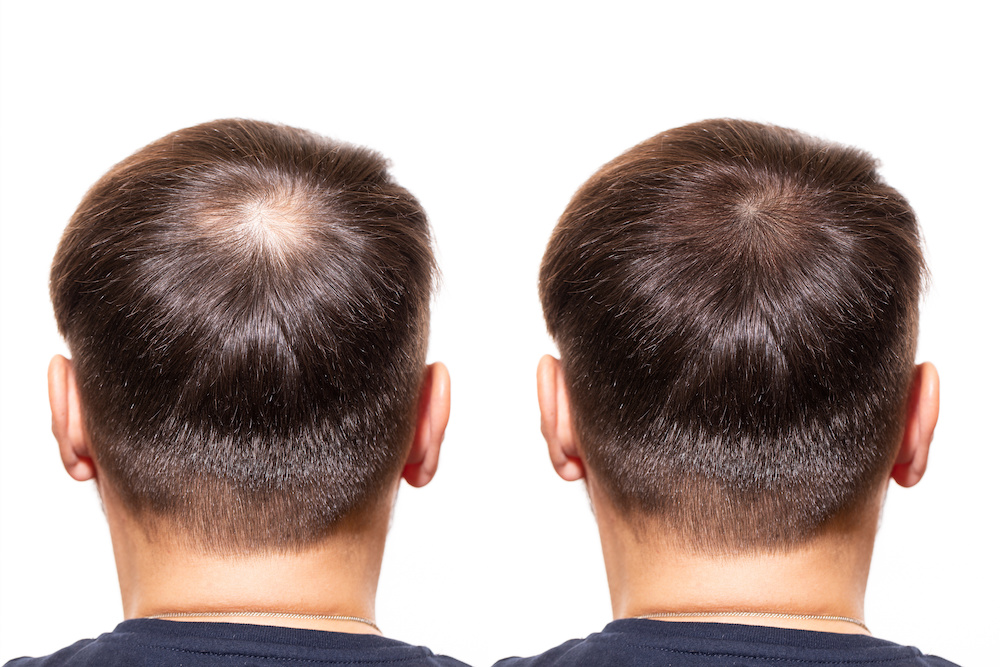




 SKINCEUTICALS
SKINCEUTICALS ZO SKIN HEALTH
ZO SKIN HEALTH FAITH SKINCARE
FAITH SKINCARE FILLMED
FILLMED RENECELL
RENECELL MESOESTETIC
MESOESTETIC SKINSTITUT
SKINSTITUT CLEARANCE
CLEARANCE



